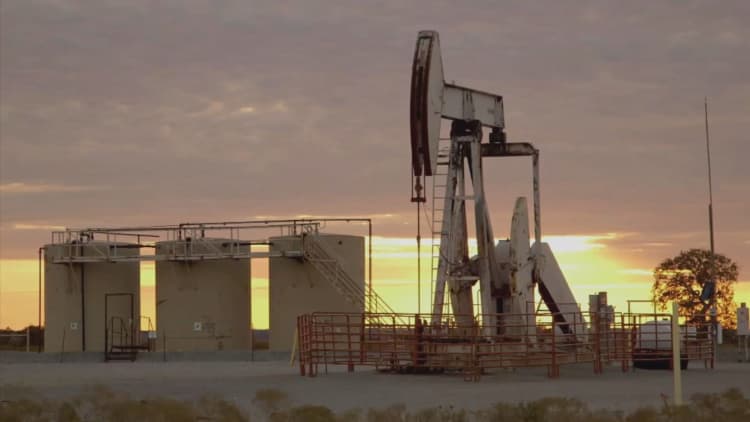
Oil prices slipped on Thursday, backing off from earlier gains spurred by tension around northern Iraq following the Kurdistan region's vote in favor of independence.
Crude has risen sharply in the last two-and-a-half weeks, in anticipation of renewed demand from U.S. refiners in the wake of Hurricane Harvey, and expectations for ongoing efforts by major world producers to limit supply.
However, both benchmarks are near overbought levels, based on an index of relative strength, which measures the speed and magnitude of price movements. U.S. crude has gained 9 percent in the last 14 trading days, while Brent is up 7 percent in that time period.
"We've made a really impressive run here and I do think we're due for a pullback," said Robert Yawger, director of energy futures at Mizuho in New York.
U.S. light crude ended Thursday's session down 58 cents, or 1.1 percent, at $51.56 after reaching a five-month intraday high of $52.86 a barrel.

Brent crude oil was down 59 cents, or 1 percent, at $57.31 a barrel by 2:15 p.m. ET (1815 GMT). It hit a more than two-year high of $59.49 on Tuesday after Monday's referendum vote prompted Turkey to threaten to close the region's oil pipeline.
"Kurdistan and Northern Iraq now export 500,000-550,000 barrels per day (bpd). That would be a big loss to the market," said Tamas Varga, analyst at London brokerage PVM Oil Associates.
Iraqi Kurdistan voted overwhelmingly on Monday in favor of independence, prompting Turkish President Tayyip Erdogan to say he could use military force to prevent the formation of an independent Kurdish state and might close the oil "tap."
Turkey promised on Thursday to deal only with the Iraqi government on crude oil exports, "restricting oil export" operations to Baghdad, the office of Iraqi Prime Minister Haider al-Abadi said.
Torbjorn Soltvedt, principal analyst for the Middle East at risk consultancy Verisk Maplecroft, said there was a roughly 20 percent chance that the pipeline linking northern Iraq and Ceyhan in Turkey would be shut.
"It's not inconceivable that Turkey would sacrifice trade and oil flows for domestic political issues," he told Reuters Global Oil Forum. "If things keep escalating after this then (oil) supply could become a real concern."
Brent's premium over U.S. crude widened to a more than two-year high this week, in part due to reduced demand stemming from Harvey, but it has since narrowed and could tighten further in coming weeks due to higher margins for refined U.S. products.

Yawger noted that a sharp drawdown in U.S. distillate inventories - diesel and heating oil - ahead of the busy winter season should spur demand for crude in coming weeks, keeping any selloff modest.
U.S. crude prices found some strength from a surprise fall in U.S. stockpiles. Domestic crude inventories dropped fell 1.8 million barrels last week, the U.S. Energy Department said, versus forecasts for a 3.4 million-barrel build.
U.S. refiners are still returning to full operations after Hurricane Harvey last month, but gasoline stocks surprisingly rose and stocks of distillates fell less than anticipated.
While this week's U.S. data gave a mixed picture, the outlook for global oil demand has strengthened, analysts say.
The International Energy Agency earlier this month raised its 2017 global oil demand growth estimate to 1.6 million bpd from 1.5 million bpd, citing stronger than expected demand growth in the United States and Europe.
Still, U.S. crude production rose to 9.55 million bpd last week, according to preliminary weekly figures, higher than before Harvey hit the Gulf Coast.

